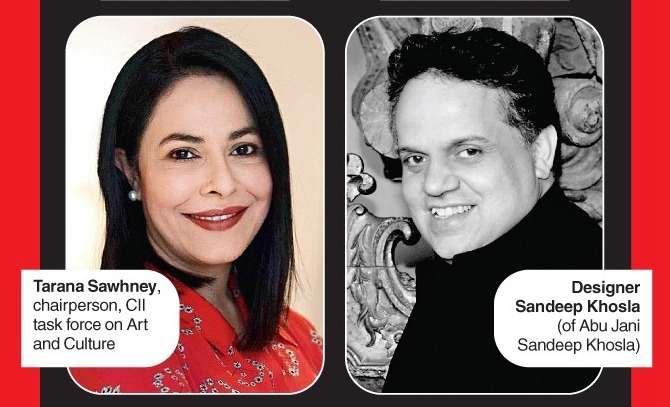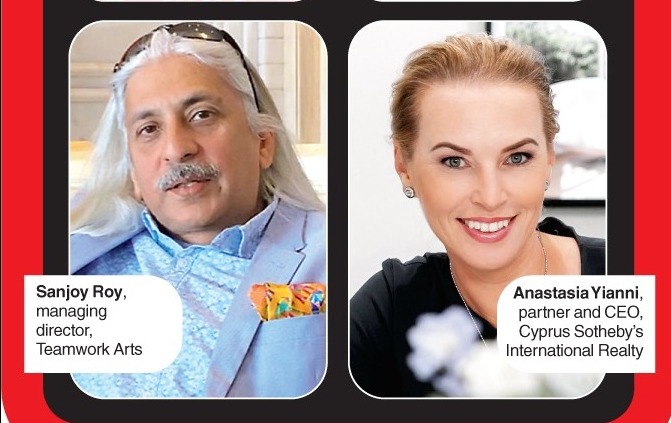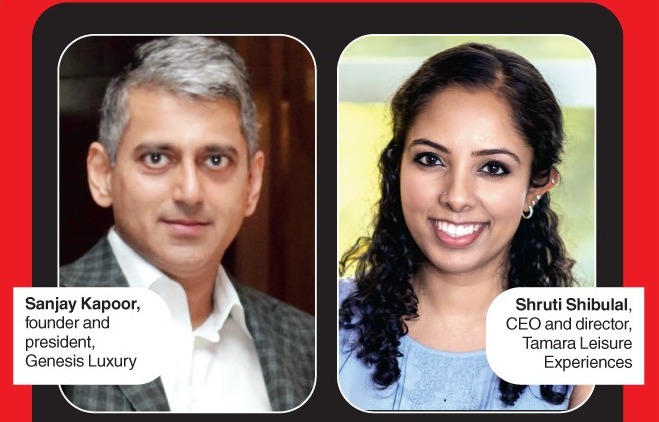While the pandemic has turned many of our ideas about the “purpose of life” on its head, various segments of the Indian market that concerns itself with “luxury” products — both tangible and experiential — are now considering newer ideas and processes for the fruition of those. This brings us to the subjective definition of the word “luxury”, which has many different interpretations. While being able to finish a book without any distractions is what luxury currently means to me, a state-of-the-art gadget might mean the same to someone else. Foremost, it is the luxury of human company that this pandemic has left most of us craving for. At a panel discussion on June 16, constituted by India Sotheby’s International Realty to discuss the ‘Purpose of Life’ during the the fourth edition of the Global Luxury Realty Conclave, six speakers got together over Zoom to talk about their take on ‘luxury’. Designer Sandeep Khosla (of Abu Jani Sandeep Khosla); Sanjay Kapoor, founder and president, Genesis Luxury; Manjari Sihare, head of sale, Modern and Contemporary South Asian art, Sotheby’s Auction (New York); Shruti Shibulal, CEO and director, Tamara Leisure Experiences; Sanjoy Roy, managing director, Teamwork Arts; and Anastasia Yianni, partner and CEO, Cyprus Sotheby’s International Realty, shared their thoughts during the discussion that was moderated by Tarana Sawhney, chairperson, CII task force on Art and Culture, and Samir Saran, managing partner, India Sotheby’s International Realty. Excerpts:

Tarana Sawhney, chairperson, CII task force on Art and Culture and Designer Sandeep Khosla (of Abu Jani Sandeep Khosla) Sourced by the Telegraph
The Idea of Luxury
Sandeep Khosla
I think luxury will remain luxury and nothing much will change. We Indians are very resilient as people so we have a wonderful power to bounce back from time to time. Luxury is about fabulous fabulosity, detail and craft for me. I suppose, to our audience, it means all the same things. If you’re wearing a wonderful, luxurious silk or cotton shirt with embroidery today, you will continue to wear it tomorrow, even if you hold back from buying any immediately. That does not mean the standard of luxury will change.
Sanjay Kapoor
Luxury varies from person to person — for an 80-year-old grandparent, spending time with their grandchildren is luxury. In its most traditional form, luxury is about research, experiences and craftsmanship. But with Covid-19, one thing that I have seen across countries is “wellness” actually. This is the new health and people are being proactive rather than reactive about it. The original version of luxury stays the same though.
Shruti Shibulal
Luxury to me is an experience and for what we do, it lies in personalisation, curation, finding a guest’s needs before even they know that they have those needs. It’s about understanding their needs and what touches their hearts. In that sense, a lot of it will remain the same. To feel at peace and connect with nature are things that people will treasure more, going forward. Wellness and well-being through a focus on things such as Ayurveda and naturopathy are also there. The challenge is that we are trying to get all of these things back but there is the added element of safety and hygiene. Brands in the hospitality industry are really trying to build trust with the guest to ensure that they can come to us and forget about what’s going on in the world.
Anastasia Yianni
We do see changes in the approach of people to luxury, even though luxury in itself won’t change. Now, we also have the luxury of freedom and global mobility because in Cyprus, we have seen that people have the drive to afford instruments that can help them get to a safer place and this is true luxury at the moment. The new luxury, now, is also home and the importance of it. The lockdown showed us a lot of different aspects of luxury, in the local and personal sense.

Sanjoy Roy, managing director, Teamwork Arts and Anastasia Yianni, partner and CEO, Cyprus Sotheby’s International Realty Sourced by the Telegraph
Sanjoy Roy
To begin with, just having to go to office today is a luxury that a lot of people, perhaps, don’t have any more. The ability to go to a theatre, concert and the very sense of time in itself are luxury. And the kind of luxury that we need to concentrate on is that of love, empathy, well-being and to go beyond the virtual world and give someone a hug.
Manjari Sihare
I think people are taking out the time to celebrate the things that we took for granted so far. I am getting calls from clients who bought a work five years ago and they’re telling me that they are rediscovering something new in it every day now. For me, personally, luxury is comfort. Because the world has stopped now, people are also taking out the time to think about a more responsible way of consumption of things.
Sustainability
Shruti: Sustainability and responsible hospitality has been at the core of our business. The whole life cycle of our business from conceptualisation and creation to operation concerns itself with the idea of sustainability. We have already seen that guests have a deep appreciation of how we do our business. And right now, guests will be more selective about the places and the companies they support because we have a vision of what can go wrong.
Sanjay: As it is, there has been a huge push towards sustainability in the last four-five years and the current situation has just aggravated and accentuated the whole thing. Rather than loosely using the word “sustainable”, people want to know more about it. And like in the case of health, even for sustainability, people are taking a more proactive role in it, rather than reactive. So it’s not just enough for a brand to say “I am sustainable” but what are you really doing about it? We are aware that many of the luxury brands have helped out during this crisis because they also have the reach with the public that normal brands don’t have.
Sandeep: “Sustainable” is such a wide term and it’s being misused and abused by everybody like “luxury” was the “in” word many years ago. Fortunately, our clothes are sustainable because people have been wearing them for the last 30 years so it’s all about craft. I think the only change that there will be is that people are going to be more particular. Instead of 30 things, they will buy one thing and make sure that that one thing is the best that they buy. People are going to be more conscious about what they buy. Everyone will not survive but some of us will. We try to hold out ourselves because we support several craftsmen and just to keep them afloat through this crisis has been a challenge. One really wants to get back to working so that the craftsmen can get back on their feet.
Sanjoy: What used to happen in the past during a natural disaster is that the artists and craftsmen would shift to the next village to perform or sell their wares. But that’s not possible now. If an artiste does not perform or sell, he or she does not eat. They don’t have the security of homes and banks that we have. So how do you look globally but through local consumption?
How do you look at the needs of the local artisans and then create a global product out of it? The way we are doing it is that we have migrated many of our products on to digital platforms but that is also because we have that kind of heft to convert audiences and carry them wherever we do. However, do we have the heft to make it pay for itself? I was asked why artistes need money and shouldn’t they be donating money to us, and I had to turn around and say that not every artiste is a Brad Pitt or a Shah Rukh Khan, an M.F. Hussain or Kailash Kher. We have millions of artistes of exemplary quality in India and we may take months to come up with a product that is invaluable but we don’t value it, unless it’s a Louis Vuitton bag. But we will haggle with a potter or for a Maheswari sari. So how do you advocate for these products? These are some the questions that we have to find answers for and be able to create new value and luxury.
Manjari: Art buyers have become extremely conscientious and they are asking for more information about the products. There is more emphasis on classical elements, about craftsmanship and heritage, rather than just bling. The last live sale that Sotheby’s did was on March 16 on modern and contemporary South Asian art, which had a paper cut-out by Benode Behari Mukherjee and many of our collectors were enquiring about the process. His process was that he created these cut-outs when he was blind and he always said that he could feel colour and form; and that story of how he did not give up on his drive for creation. That work went on to make a world record for the artist at auction because people were simply enamoured. As far as Sotheby’s is concerned, we have had a great year and we had a number of charity auctions. We had a charity auction called May Day in partnership with Google, which was an experience-based auction wherein you could bid for a coffee with Hillary Clinton or a day with an astronaut from Apollo or a one-on-one comedy session with Sacha Baron Cohen. One would think that Cohen or a Hollywood star would garner more bids but it was really things like coffee with Clinton that got more interest as people want to know what’s going on with the world from an American presidential nominee.
Anastasia: I think the situation today has shown how small the world is — an accident in China brought the whole world to this. Now, we see that more and more people want to look forward to anywhere and it does not have to be Cyprus. Being restricted within the walls of our house has increased this desire to have no borders. But this sense and desire for freedom is something that will continue after this is over as well.










